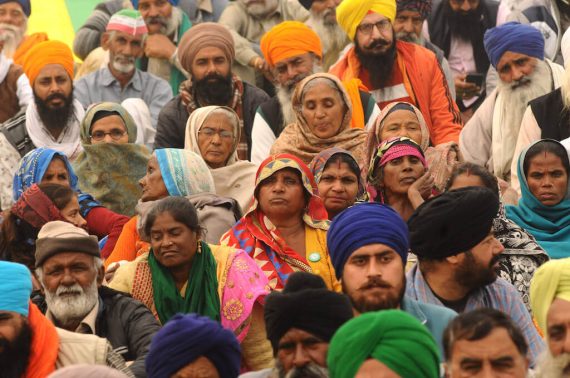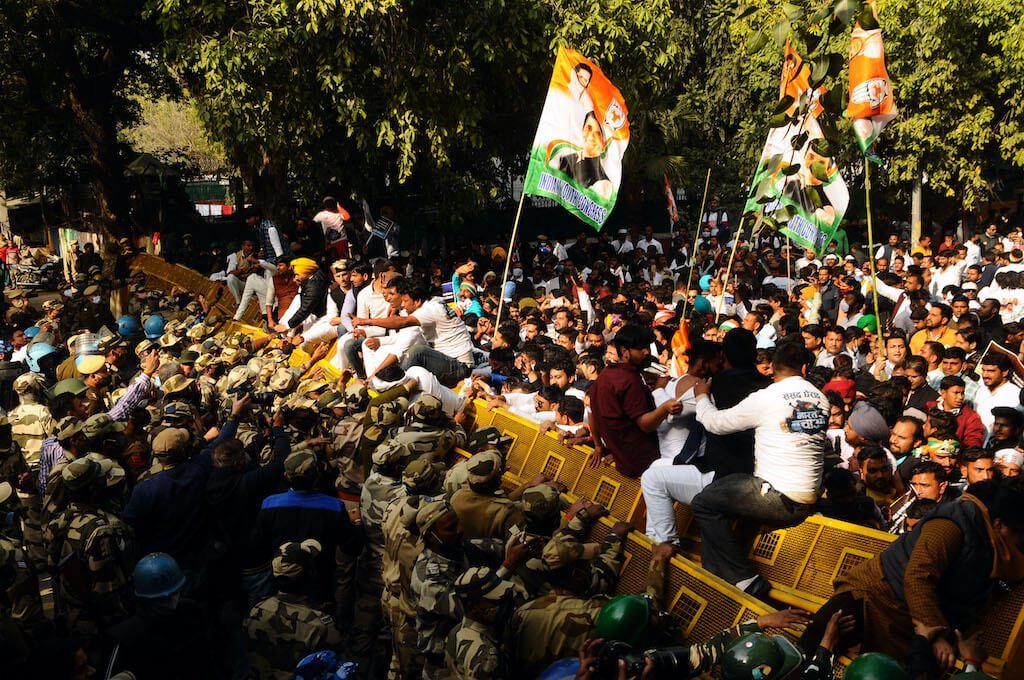Three new farm laws – The Farmers Produce, Trade and Commerce (Promotion and Facilitation Act), 2020; Farmers’ (Empowerment and Protection) Agreement on Price Assurance and Farm Service Act, 2020; and the Essential Commodities (Amendment) Act, 2020 – were hurriedly enacted by the Indian Parliament during the COVID-19 pandemic in September 2020 following an earlier ordinance in June of the same year.
However, these laws do not address the structural challenges of Indian agriculture such as landlessness, the growing cost of agriculture, agricultural indebtedness, and farmers’ suicide. They do away with restrictions of selling to the agricultural big markets (mandis). They do away with middlemen in the sale of agricultural produce whereby farmers can directly sell to the buyers, both state and market-based. The removal of the middlemen in the laws is a welcome step. The new laws also do away with the state’s ability to levy fees on these sales which infringe on the state’s rights, and continue the dangerous trend of increasing centralization and destruction of the fragile culture of federalism in India.
The law on contract farming facilitates the latter but it is much more biased towards big landlords and corporations rather than small, marginal, and landless farmers. Contract farming seems to be a guise for corporate farming. The Essential Commodities (Amendment) Act, 2020 removes food stuffs such as cereals, pulses, potatoes, etc. from essential commodities which gives rise to a fear that the trade of these commodities might lead to hunger and famine.
The lack of a statutory minimum support price (MSP) in the bills is a matter of grave concern for the farmers especially in Punjab and Haryana where 65% of wheat is procured through the MSP by the Food Corporation of India and state agencies. But experts challenge us to realize that legalization of an MSP in the bills is not necessarily helpful and it could lead to depression of agricultural markets forcing farmers to sell at below MSP prices as private buyers may go where prices are cheap.
Farmers have been protesting against these laws since September 2020. Farmers’ protests have a long genealogy in India. Upon assuming office in 2014, Prime Minister Narendra Modi tried to change the Land Acquisition Act, easing corporate and state acquisition of lands which followed huge popular protests leading to halting the move. The three farm laws were enacted in both houses of the Indian Parliament without following due process of parliamentary procedures such as sending the bills to the relevant Select Committee of the parliament.
These laws continue the hurried and authoritarian promulgation of laws and ordinances such as the demonetization of currencies in 2016 by PM Modi and the abrogation of Article 370 in Jammu & Kashmir in August 2019 by acts of the Parliament of India.
Indian farmers have been striking by sitting at the Delhi border in Sindhu and Tikri since November 26, 2020 amidst biting cold and a lot of difficulties.
But while the Supreme Court of India is still sitting on the constitutional validity of the government’s new laws on Jammu and Kashmir, in the case of the new farm laws, the Supreme Court has held the ruling government accountable to some extent. It has raised some questions. It appointed an Expert Committee for consultation on these issues, but members of the committee do not have the trust and confidence of the protesting farmers.
The new farms laws in India and the handling of the issue by the ruling government reflect the breakdown of trust between the ruling establishment and the people of India at large, and especially the farmers and non-corporate India.
Farmers have been striking by sitting at the Delhi border in Sindhu and Tikri since November 26, 2020 amidst biting cold and a lot of difficulties. This agitation has been mainly peaceful and has drawn support from a wider section of society including trade unions and political parties such as the Indian National Congress and left-wing parties.
The movement has been more broader-based compared to earlier farmers’ movements. The number of women at the protests is huge. On Republic Day last January 26, there was a tractor protest rally which unfortunately led to violence and the unfurling of a religious flag in one of the empty posts of the Red Fort in Delhi. But, for the protesting farmers, such violence was a conspiracy by unruly elements. On February 6, there was a countrywide chakka jam, or road blockade.
Farmer leaders such as Rakesh Tikait are holding Mahapanchayat meetings in Haryana, which are made of people from different villages, in Haryana and they want to hold panchayat-level local meetings all over the country. This helpfully would galvanize the people’s protests against the policies of the ruling regime which is bent on the corporatization and privatization of India.
The budget just presented by the government has reduced allocation for the Mahatma Gandhi National Rural Employment Guarantee Act and for women and child development programs, and is on a mad spree of privatization of public sector assets and companies.
The Indian government’s handling of the protests has been authoritarian and draconian. The farmers’ protests have been deliberately painted as linked to anti-national elements such as the Khalistan movement. Since the beginning of the protests, international leaders such as Canadian PM Justin Trudeau have supported the movement and have called for a dignified dialogue between the government and the farmers. Support has recently grown with endorsing declarations by pop singer Rihanna and young Swedish climate activist Greta Thunberg who shared a tool kit for non-violent grassroots protests on Twitter.
The Delhi Police has filed a report against Thunberg. Furthermore, the Delhi Police and a number of Indian states have filed reports against politicians and journalists such as Shashi Tharoor and Rajdeep Sardesai for their reporting on the violence in Delhi on January 26. The Indian Supreme Court has fortunately come to their rescue by preventing any arrests. Sedition charges are also being slapped on critical thinkers and journalists. Such measures continue the regime’s efforts to create a state of fear and terror so that nobody can publicly dissent.
Modi himself has termed international concern over the farmers as “foreign destructive ideology” (FDI), calling the protestors “andolana jeevi” (living off the protest) and “parajivee” (parasites). Farmer leader Rakesh Tikait and others have responded by calling Modi and others “corporate jeevi” (living off corporate funding).
Recommended
Nearly one thousand people have died in the farmers’ protests including people committing suicide in protest. Protesting farmers treat the latter as martyrs and the government’s calling them “andolana jeevi” is seen as disrespectful. Those who make such accusations are, in turn, considered para rakta jeevi (parasites thriving on other people’s blood).
Modi has argued that these agriculture laws would be a watershed moment in Indian agriculture leading to prosperity in the way the Green Revolution, which had also faced opposition, was a watershed moment for India sixty years ago. However, the Green Revolution was possible because of the collaboration of the state, the scientific community, and the banking sector.
It was a state-driven project. We now need a new Green Revolution—an “Evergreen Revolution” as Dr. M.S. Swaminathan, the father of India’s Green Revolution, articulated, creating bio-happiness, food security, and cultural and bio-diversity. We need transformative initiatives in agriculture, economy, technology, science, and people’s movements. These new laws, however, are corporation-driven. Instead of corporatization of agriculture and privatization of both agriculture and industry, we need more initiatives by the state and the people.
We need land reforms and land for the landless as was articulated by the Gandhian people’s movement Ekta Parishad. Ekta Parishad organized the Jan Satyagraha 2012, a non-violent foot march, from Gwalior to Delhi on October 2. Back then, the ruling establishment under the dispensation of then Prime Minister Manmohan Singh signed an agreement with Ekta Parishad that it would enact a law that grants land to the landless.
But this agreement has been on the shelf since then. The present government could have built on such transformative initiatives rather than promulgate the new farm laws which do not address the root causes of agrarian distress or poverty and misery in rural India.
The slogan of doubling farmers’ income seems to be an empty one. Real prosperity in India depends upon transformative initiatives such as an Evergreen Revolution creating sustainable and ecological agriculture, the creation of farmer-producer organizations, greater public investment in agriculture, a new extension of education, and the creation of a culture of dissent, dialogue, and diversity.

VIDEO: Decoded: India Farmers’ Revolt
The Indian farmers’ protest movements also need to articulate and strive for alternative development such as more sustainable and ecological agriculture and just development for all, inclusive of caste, class, and gender.
The abrogation of these new laws is not the solution and all concerned people have to sit together – rural farmers and urban dwellers, Indians and international friends – for creating a better India and a better world, going beyond narrow tactics of fear, intimidation, and destruction of lives. With and beyond the new Indian farm laws, we can sing of a new revolution – an Evergreen Revolution of sustainable prosperity, Ananda, and the leaving behind of the present culture of fear, terror, and the destruction of lives and livelihoods.






